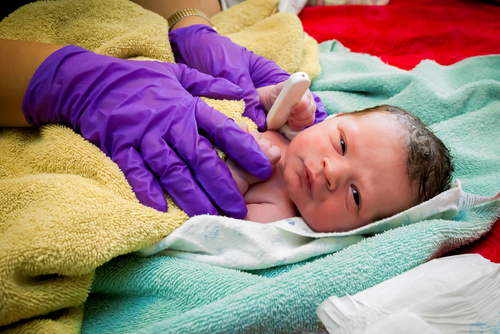Babies Protected in Womb from Inflammation at Lower Risk of Cerebral Palsy, Study Shows

Babies able to switch on a mechanism — while still inside their mothers’ wombs — to protect themselves against inflammation are at lower risk of brain bleeds, cerebral palsy (CP), or death, according to a recent study.
This protection depends on the fetuses’ ability to produce a protein called haptoglobin, which may serve as a useful biomarker in predicting newborns’ risks of developing disabling or life-threatening conditions, clinical data showed. Researchers said the data also may help doctors to improve timely treatments at birth.
The study, “Cord Blood Haptoglobin, Cerebral Palsy and Death in Infants of Women at Risk for Preterm Birth: A Secondary Analysis of a Randomised Controlled Trial” was published in the journal EClinical Medicine.
It is well-known that preterm delivery, particularly when associated with intra-uterine infection and sepsis (overactive response to infection) in the baby, puts infants at high risk of brain bleeds (intraventricular hemorrhage), developmental delays, and cerebral palsy.
However, not all babies delivered prematurely, where infection is present, will be affected by these problems. Also, there is evidence that it is the prolonged exposure to inflammation, rather than a bacterial infection itself, that may lead to adverse outcomes in the newborn.
A team of researchers at the Maternal-Fetal Medicine Units Network (MFMU), an initiative of the Eunice Kennedy Shriver National Institute of Child Health and Human Development (NICHD), made a surprising finding in 2011. They saw that haptoglobin, a protein normally considered close-to-absent at birth, was elevated in the cord blood of premature newborns with early onset sepsis.
Haptoglobin is an acute-phase protein, whose levels rapidly rise in the blood in response to an infection, trauma, or other tissue injury. It is produced in the liver and is a potent antioxidant abundant in the plasma.
In that study, the team found that haptoglobin cord blood levels were a better predictor of adverse outcomes for newborns, including brain bleeds and death, than a clinical diagnosis.
Based on these findings, the team believes that babies who switch on early haptoglobin production, while in the uterus, are better protected from damage that could result in cerebral palsy.
Researchers now evaluated cord blood samples from 921 newborns of women at risk for preterm delivery, which were stored from a prior MFMU clinical trial that tested magnesium sulfate for CP prevention (NCT00014989).
Intra-uterine inflammation was detected by measuring the levels of IL-6 cytokine, a signaling molecule that rises during inflammation.
Newborns were grouped into three categories according to their haptoglobin levels and IL-6 status: not exposed to inflammation (47%); exposed to inflammation and with high levels of haptoglobin (49%); and exposed to inflammation, but with either low levels or absence of haptoglobin (4%).
Data showed that newborns who either lacked or produced low levels of haptoglobin were at higher risk of brain bleeds and/or death, and cerebral palsy and/or death, versus infants who were able to switch on haptoglobin production.
In fact, those who were able to turn on haptoglobin production had a risk as low as those who were not exposed to in utero inflammation, regardless of gestational age, birth weight, sex, and treatment with magnesium.
In addition, the type of haptoglobin gene variant active in the babies also seemed to matter. Newborns who expressed the gene variant Hp2 were better protected against a blinding eye disorder of premature infants called retinopathy of prematurity.
“The current study underscores the potential protective role of Hp [haptoglobin] against major short- and long-term poor neonatal outcomes and may prove to be a valuable marker of neurologic damage in neonates exposed to inflammation in utero,” researchers concluded.
